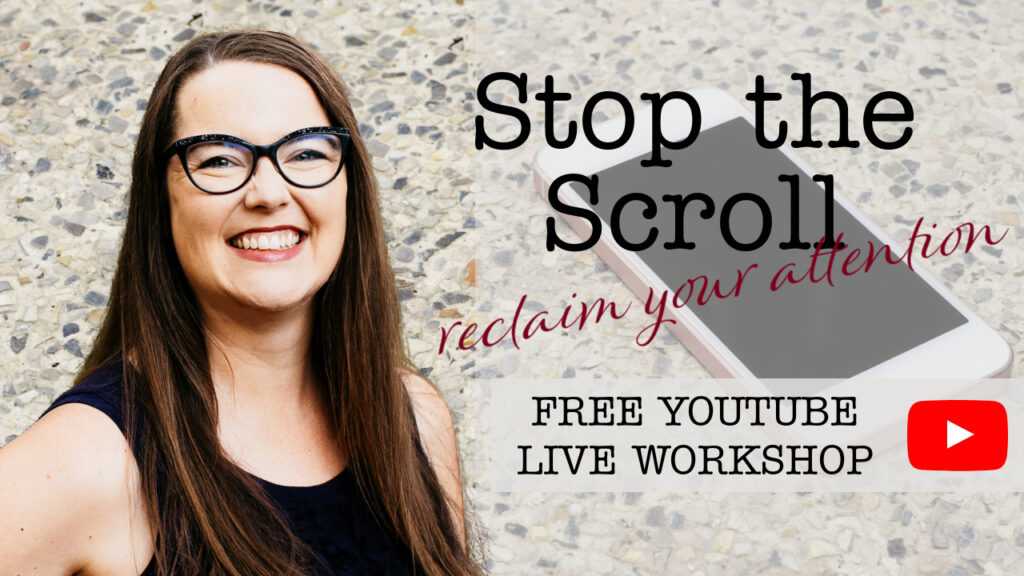We’ve all been there, zoned out on the couch, flicking through the screens. It might be Instagram. It might be Amazon. It might be headlines or search results. But we compulsively scroll.
A little niggling feeling tells us that we should stop. Then we spot another little nugget – a photo, a meme, an emoji, a zinger, a promising sentence – and we look. We continue. We’re drawn in.
Thirty minutes later we look up, lost from our world, disoriented, abashed at the time that has passed. We’re not better people for this. We had our curiosity tickled. We saw a lot of things. None of it mattered. None of it made a difference.
If we think about it later, if it stays with us after we finally force ourselves to close the app or the window, it’s probably because the thought, revelation, or image was jarring.
We went to learn, to connect, to be informed, to make a statement or discover other people’s statements, but none of that kept us scrolling. Scrolling is compulsive behavior. It can eat our time, our energy, our mind – with a spoon. That’s what it does for fun.
Sometimes the scrolling is shopping. Sometimes it’s just flipping moment-by-moment, picture-by-picture, across Instagram. Sometimes it’s thumbing through pages of Google results or Babylon Bee headlines.
Whatever the scroll, it’s addictive behavior that leaves us worse than we were when we began.
After the zoned-out scroll, it’s difficult to reenter life, to engage face-to-face with people, especially small, noisy, needy people. We need a little space and buffer to reorient ourselves, but we lost ourselves when we should have been working, and so the work hits us with more overwhelming force than it ought.
Social media isn’t the problem
I got off Instagram 3 years ago. You can read my original article with ten reasons why I quit Instagram here. I also wrote about what I learned after being off Instagram for 3 years here. But here’s the truth: I still lose myself scrolling.
It’s harder now, which means it’s more occasional. I seem to lose myself to zoned-out scrolling just often enough to keep me humble and remember that there’s no virtue in not having social media accounts.
It is definitely possible to lose oneself to mindless scrolling without social media. Quitting Instagram, Facebook, or any other, is not a push-button solution.
Google, Amazon, Babylon Bee, YouTube, and yes, Instagram and Facebook – maybe even Twitter, X, outrage machine whatever – can all be used non-addictively, productively, as tools. More power to those who do so. Their voices and work are needed.
But we all must be aware of the ground we enter when we tap the app or open the tab. The platform thrives on exploiting addictive behaviors because they make money based on what they can expose our eyeballs to. Our eyeballs are valuable to them.
Are we ninjas, going in, doing our business, and getting out, such that they don’t get us, don’t touch us, don’t see us? It’s possible, but difficult. It’s easy to self-deceive.
Or do we go in with good intentions and get sucked in beyond the time we intended, beyond the scope of our initial task?
We have to start by being honest with ourselves, which probably means looking at our laptop and phone reports and getting some real numbers.
We can’t and shouldn’t try to be absolutely top-level productive every moment of every day; however, the reality is that while scrolling promises a break, rest, it leaves us drained rather than replenished. It saps our vitality; it does not improve it.
The Information-Action Ration
I think a large part of that dynamic is due to what Neil Postman called out as the Information-Action ratio (We discussed the information-action ratio years ago on the Scholé Sisters podcast).
Wherever we are online, we’re served up interesting news items, fascinating opinions, fierce conflicts, funny satires, and one frenetically leads to another.
Yet none of that information is actionable for us. So our emotions are stirred up, but there’s nothing for us to do with it. In fact, our healthy emotions of response are undercut by the compulsive scroll to the next thing.
If our baby was crying, the sounds alerts our emotions and prompts us to act. We go to our phones to check out of our high-strung life of in-your-face needs and service, but instead of refreshment, we’re given emotion-generators training us to disconnect our emotional response from our behavior, short-circuiting our development of personal responsibility.
At our best, we pray for the situation we randomly discover and move on. At our norm, we move on the next thing given us to discover – a thing elegantly selected by fascinating math to correctly predict the next thing that will keep the scroll going and stop us from shutting the laptop lid or setting aside our phone, even though we hear the internal mom-voice telling us that would be prudent.
How do we manage our phone use?
So what’s a strung out mom with a phone to do? Go on a phone detox. Experience life without the instant distraction and quick dopamine fix option. Your emotional and attentional life can heal, but it will take time. Pay attention to the things that require your direct action. Give your direct action. Improving our personal information-action ratio will go a long way to repair our phone habits.
What’s the tired but responsible mom to do? Make yourself smart rules, determined with your husband’s help, so you can use your phone as a useful tool and not be captured by it and held hostage. Notice when you have caved to the mindless scroll and practice putting the phone down or closing the laptop lid when you notice.
What’s the responsible mom to do who thinks this whole article is hyperbole? Rejoice you are not prone to addiction and use your time online responsibly, not only as a tool for your personal life but also as a place you can shine as a beacon, being an unembarrassed, productive, normal Christian woman – in public.
Whichever category you are in, and most of us move from one to another season by season, let’s remember that online is not a place to check out and turn off our brains. If we’re online, it has to be a place to be fully engaged, because disengaged media consumption is a top tool of the devil to corrupt families.
We all should remember that most online platforms are enemy territory in one way or another. It’s not wrong to be on Google or Facebook or X, but we should enter with our guard up, not down. We should enter as ambassadors of our king, not as free agents and certainly not as peons slave to every algorithm and influencer. Let’s use our tools and opportunities as wise, strong Christian women – and if we’re not exhibiting wisdom, let’s be willing to hit pause and – whatever we get – get wisdom.
Register for free workshop & stay tuned!




I completely agree with the author’s sentiment on wasting time scrolling through social media. It’s easy to get sucked into the vortex of endless scrolling, but it’s important to be mindful of how we’re spending our time. I’ve been making a conscious effort to limit my social media usage and prioritize more meaningful activities, like spending time with loved ones and pursuing hobbies. Thanks for sharing this thought-provoking post!